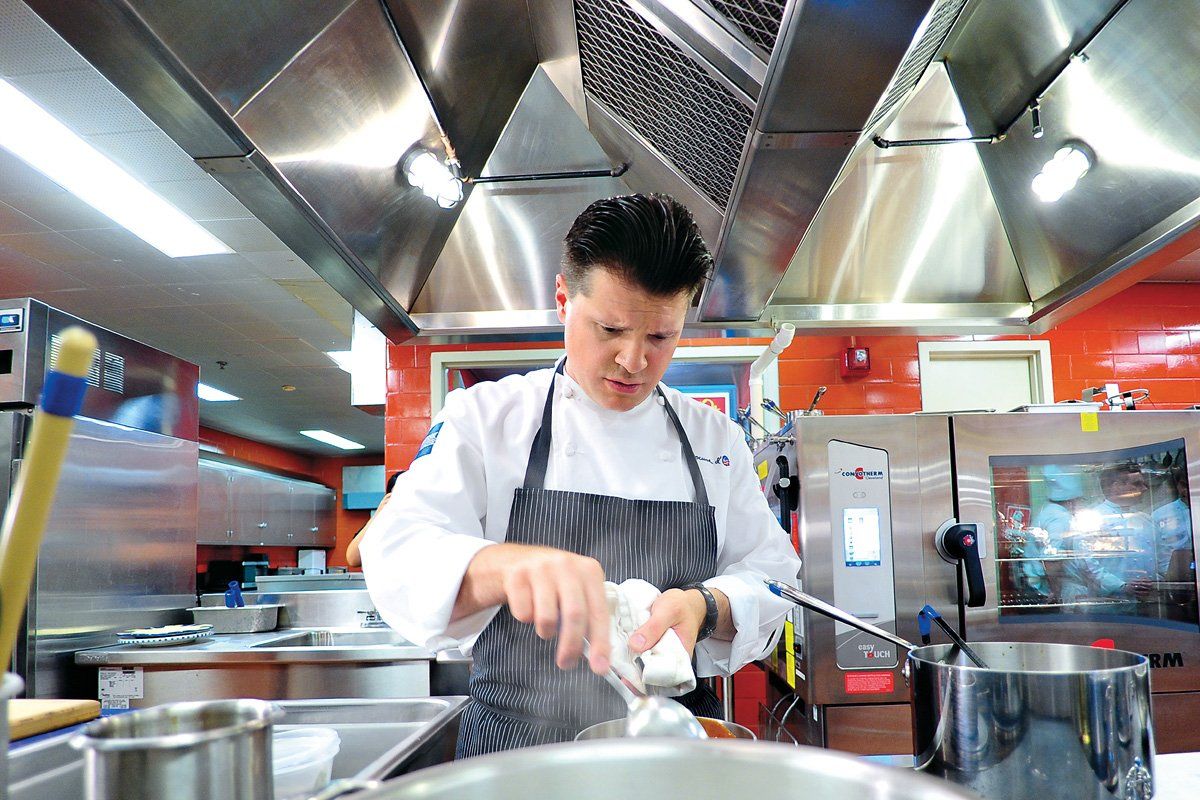
He calls it the War Room. Located behind 30-ton blast doors in a fallout shelter—built for Congress in the late 1950s and nicknamed "The Last Resort"—its walls are papered with plans, diagrams, and calendars that painstakingly plot out the minutes 'til the Big Day. Across the hall is a replica of the battle site, stocked with high-tech equipment and laid out inch-by-inch to resemble what he'll find when he touches down on French soil.
This is Richard Rosendale's command center. Inside the bunker's underground labyrinth, he's preparing to attempt a feat that, until now, has eluded American chefs: medaling at the Bocuse d'Or, the biennial competition known in the industry as a kind of cooking Olympics. Named after French culinary icon Paul Bocuse, who first dreamt up the event in 1987, it's the elite European version of the now-ubiquitous Iron Chef–style cooking showdowns that foodie audiences love.
For the next event, which takes place in January, fans will flock to Lyon to support their favorite hospitality heroes, with the atmosphere tending toward the carnivalistic. "You can feel the people cheering," says Rosendale. "It feels like a soccer game." There will be noisemakers, bands, buses full of groupies, face paint, strobe lights, thundering techno music. ("I installed speakers in the bunker," says Rosendale, "to play the crowd sounds.")
For years, the U.S. has placed abysmally—so much so that Bocuse took matters into his own hands in 2008 and appealed to legends Thomas Keller and Daniel Boulud to establish an American version in order to cultivate Yankee talent for the championship. The winner of the first Bocuse d'Or USA—Tim Hollingsworth, from Keller's French Laundry—went on to place sixth in France, tying the best U.S. result to date.
Rosendale, who got the Bocuse d'Or USA silver in '08, aims to change that statistic. The 37-year-old executive chef at the Greenbrier—a colonial hotel in the West Virginia countryside with 13 kitchens, a 44-acre farm, and the aforementioned bunker—sees his second-place finish as a "lucky miss." At the time, he was opening another restaurant, serving as team captain in a different competition, and raising a baby boy with his wife, Laura (his sweetheart since the seventh grade). "I had so much other stuff going on, there's no way I could have possibly excelled," he says.
Instead, he focused on the 2012 trials and ended up winning gold last January at the USA finals in Hyde Park. Rosendale wowed the judges with a dish of chicken breast layered with mushroom mousseline and a black truffle country ham and cornbread stuffing, cooked sous vide and then deep-fried to a golden crisp. The best part was the presentation: Rosendale took apart his son's Mr. Potato Head and used it as a mold, so that the bird looked just like a whole roasted chicken until it was cut to reveal its intricate shroomy layers. ("I'm like Hospitality MacGyver," Rosendale says. "People looked at it and they were puzzled. They couldn't figure out how you'd begin to put it together.")
For Lyon, where Rosendale will prepare both a fish and a meat dish—turbot and European blue lobster for the former, and all manner of beef (tenderloin, oxtails, shoulder, cheeks) for the latter—the chef has planned his assault with the care of a general. He's got a lot to juggle these days, from finding the time to be a family man to his wife and two sons, to overseeing the Greenbrier ("it's a massive operation") and training for France. "I try to organize myself and stick to my schedule, and make sure I'm taking care of myself and not get sick or fatigued, so that in the big picture, everything works," Rosendale says. "Because if any one of those areas begins to fall apart, it impacts everything else."
Luckily, organization is one of his strong suits—as are his experience (he's performed in over 40 international competitions), unflappable nature, and talent at blending classic technique with an uniquely American inventiveness. "I have a great classical foundation, but I also think wildly outside the box," he says. "There's a point where I veer way off and come up with something that is still recognizable but that has a very high creative component ... I love that element of intrigue that begins to build."
Helping Rosendale in his Herculean task: commis Corey Siegel, who just graduated from the Greenbrier apprenticeship program. ("He had a very busy year.") Rosendale has them on a rigorous exercise schedule, to hone their minds and get in the zone. "You may say, 'why in the world would you need to run or box for a five-hour cooking competition?' " Rosendale says. "Well, it's really not for the competition—it's for everything else around the competition and leading up to it."
Despite all the preparation, both chefs know that it comes down to one thing—game-day performance. "It's hard—you can be a really good cook, but then you go into Bocuse d'Or and have a hundred cameras in your face and all this loud noise and the pressure of cooking in a window of time like that, under tremendous circumstances," Rosendale says. "You've got to be intensely focused and go in there and know what you have to do."
Uncommon Knowledge
Newsweek is committed to challenging conventional wisdom and finding connections in the search for common ground.
Newsweek is committed to challenging conventional wisdom and finding connections in the search for common ground.





